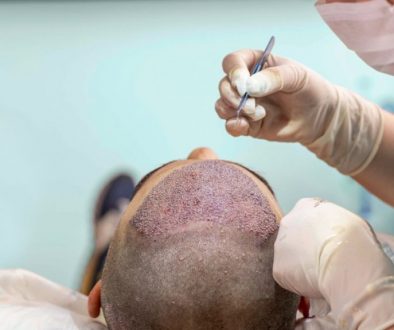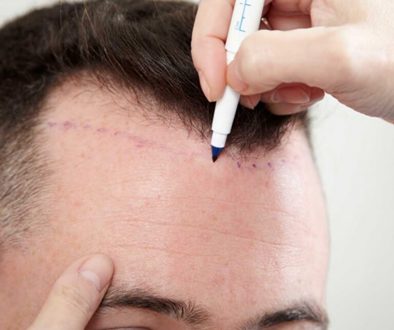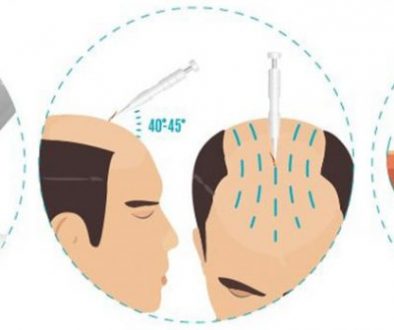Crash Diets: Can They Lead to Serious Hair Loss?
 For many individuals, crash dieting is the key to creating a quick life change. Whether it’s cutting weight for “swimsuit season” or trying to regain a previous physique, crash diets allow for rapid results and dramatic change. However, despite crash dieting’s current popularity and perceived positive aspects, it possesses several negative qualities including one side effect that most individuals rarely consider: potential hair loss.
For many individuals, crash dieting is the key to creating a quick life change. Whether it’s cutting weight for “swimsuit season” or trying to regain a previous physique, crash diets allow for rapid results and dramatic change. However, despite crash dieting’s current popularity and perceived positive aspects, it possesses several negative qualities including one side effect that most individuals rarely consider: potential hair loss.
Why does crash dieting lead to hair loss? What can be done to prevent this? Should “crash dieters” consider the potential for hair loss before beginning a dieting phase?
According to experts, a crash diet is defined as a period of extreme nutritional deprivation, where dieters usually drastically restrict caloric intake in order to achieve rapid weight loss. What’s more, most nutritional experts believe the human body interprets crash dieting and blatant starvation as the same phenomenon. Although these diets do create rapid weight change, they do not lead to long-term weight loss, nor do they promote a healthy lifestyle.
Because of the unhealthy nature of these diets, many physician experts agree that the extreme programs can lead to serious hair loss. According to these experts, it appears as if crash dieting causes hair loss for three different reasons: 1. a lack of essential vitamins, 2. inappropriate distribution of essential vitamins, and 3. a tendency to maintain hair follicles in the telogen or “resting phase.”
Lack of Essential Vitamins
Hair follicles, like any other living body tissue, require a strict regimen of vitamins and nutrients to properly grow and flourish. According to recommended hair transplant surgeon Dr. Michael Meshkin:
Crash diets and caloric deprivation of less than 1,000 calories per day or sudden weight loss of more than 20 pounds have been reported to be associated with hair loss. The evidence of hair shedding can be noticed one month after the diet begins. Nutritional factors that are necessary for hair growth are protein, fatty acids, Zinc, Iron, Biotin, Magnesium, vitamins A,C, E, and B complex. Like any other body organ, the hair needs food to grow. Therefore, it is important to know about the quality and quantity of the various nutrients necessary for healthier hair.
As Dr. Meshkin stated, without these crucial vitamins and nutrients, hair follicles cannot thrive. What’s more, during a crash dieting session, the lack of proper nutrition deprives the body of all these complexes and leads to follicular damage and serious hair loss.
Distribution of Essential Vitamins
Although a general lack of vitamins and nutrients is a big concern while crash dieting, it’s not the only essential nutrient problem. Individuals undergoing crash diet programs suffer from not only a lack of vitamin and nutrients, but also from inappropriate distribution of vitamins and nutrients. When the human body is experiencing starvation, its natural instinct to survive shunts the supply of vitamins and nutrients to vital organs (brain, heart, etc). Although hair follicles are important to many individuals who adore having hair, the body does not view them as vital to survival. Because of this, during periods of crash dieting, the body will shunt its already limited supply of vitamins and minerals to large, critical organs and completely starve the hair follicles.
Prolonged Telogen Phase
In a healthy scalp, hair follicles circulate through a life cycle (or hair growth cycle) of three phases: the anagen or “growth” phase, the catagen or “regression” phase, and the telogen or “resting” phase. During the telogen phase, the hair follicles no longer grow and prepare to shed and make room for new, anagen cycling hair shafts. According to hair restoration experts, at any given point in time, over 90% of scalp hair is in the anagen phase, with only 10% experiencing telogen shedding. However, during periods of stress, experts have observed a drastic change in the amount of follicles in the telogen phase, with a much larger number leaving the proliferative, healthy growth phases and entering the stagnant shedding phase. Much like anxiety or emotional life changes, the human body interprets crash dieting as a form of extreme stress. Because crash dieting places the body in a stressed state, it greatly increases the number of follicles experiencing telogen cycling and creates serious hair loss.
Whether it’s inappropriate levels of vitamins and nutrients or stressed induced telogen cycling, crash dieting can lead to unnecessary hair loss. Although the loss is likely temporary and will eventually reverse with normal nutrition and proper dieting, it still demonstrates the unhealthy nature of crash dieting.
_______________________
Blake Bloxham – formerly “Future_HT_Doc”
Editorial Assistant and Forum Co-Moderator for the Hair Transplant Network, the Hair Loss Learning Center, the Hair Loss Q&A Blog, and the Hair Restoration Forum
Follow our community on Twitter
Watch hair transplant videos on YouTube
Technorati Tags: crash dieting, crash diets, hair loss, Hair follicles, hair transplant surgeon, hair growth cycle, hair restoration



